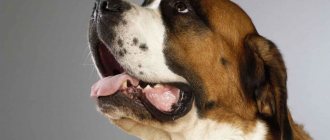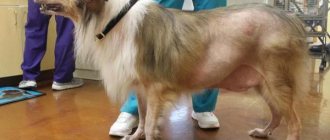In the article, I will analyze the main causes of bad breath, called halitosis, or why a dog’s mouth smells like rotten meat (fish), I’ll tell you how to treat it if it stinks from the mouth, what to do and how to get rid of the bad smell, and preventive measures at home.
Bad breath: physiology or disease?
Bad breath
in medical language it is called
halitosis
. There are physiological and pathological halitosis. Bad breath often appears in the morning. During the night, bacteria and their metabolic products accumulate in the mouth, which causes a bad odor. This type of halitosis is physiological and can be eliminated by simply brushing your teeth. Physiological halitosis also includes odor caused by eating a number of foods, such as garlic, onions, cabbage. This smell will disappear on its own as soon as the substances that caused it are eliminated from the body. But it also happens that an unpleasant odor is not eliminated using hygiene procedures; in this case, most likely, it is of a pathological nature.
Additional symptoms
Since halitosis can be caused by many different pathologies, it is difficult to list, let alone remember, all the accompanying symptoms. Be aware that you should be wary of any changes in your pet’s behavior, and especially:
- constant drooling;
- loud slurping while eating;
- lethargy and apathy;
- attacks of aggression;
- deterioration in the appearance of skin and fur;
- poor appetite;
- Diarrhea or constipation, etc.
If these or other symptoms appear, be sure to consult a veterinarian.
Bad breath: causes
The most common cause of unpleasant odor is the active activity of pathological bacteria in the oral cavity. Diseases such as caries, periodontitis, pulpitis, periodontitis, gingivitis, stomatitis, as well as the formation of tartar can lead to persistent bad breath.
The second place among the causes of unpleasant odor is dry mouth (the medical term is xerostomia
). Mica, which moisturizes our mouth, has bactericidal properties. It kills bacteria, neutralizes their waste products, rinses and cleanses the oral cavity. If there is not enough saliva produced, bacteria are activated, resulting in an odor. Dry mouth can be a consequence of illness or taking a number of medications. It can also be caused by age: over time, the salivary glands begin to work less intensively, the composition of saliva changes, and its antibacterial properties are lost.
The smell can also be caused by ENT diseases: sore throat, chronic tonsillitis, sinusitis, runny nose.
Another cause of unpleasant odor is diseases of the internal organs. It can be:
- renal failure;
- liver failure;
- gastric diseases (gastritis, stomach ulcer);
- lung diseases.
Smoking is also a cause of persistent bad breath. The smell is caused by substances contained in tobacco smoke and deposited in the oral cavity. The only way to eliminate the unpleasant odor in this case is to quit smoking.
Diseases of the Chihuahua breed - symptoms and treatment
We have listed the main types of pathologies that occur in dogs of this breed and talked about the most common diseases. Now let's briefly look at the symptoms of the disease. We will indicate by what signs (symptoms) it is possible to determine that a dog requires veterinary care.
Symptoms of diseases:
- convulsions;
- apathy, lethargy;
- lameness;
- increased thirst;
- decreased appetite;
- refusal to eat;
- cough;
- discharge from the nose, eyes;
- increased lacrimation;
- itching and redness of the skin;
- hyperthermia;
- wheezing, snoring, heavy breathing;
- rare breathing;
- rapid pulse;
- frequent, infrequent, or uncontrollable urination;
- gastrointestinal disorders.
Diagnosis is carried out in the clinic, taking into account the anamnesis and analysis of the owner’s observations. Treatment for each disease is prescribed by a veterinary specialist in accordance with the age of the animal and its state of health. The doctor selects the optimal treatment regimen individually, prescribes surgery if necessary, and selects medications and treatment methods. Symptoms and treatment of Chihuahua diseases in this article are given for informational purposes only. They cannot be taken as a guide to action.
Important: all these signs (symptoms) of Chihuahua diseases should be analyzed by a veterinarian; they may indicate various pathologies; it is unacceptable to engage in self-diagnosis and self-medication.
What is bad breath like?
Peculiarities of odor can indirectly indicate the source of problems.
Hydrogen sulfide smell
(the smell of rotten eggs) indicates rotting protein substances. This smell is typical for digestive problems. A persistent hydrogen sulfide odor may indicate gastritis with low acidity or a stomach ulcer.
Sourish smell
and a corresponding taste in the mouth is noted with gastritis with high acidity. This smell may appear at an early stage of the disease, when other symptoms are not yet present.
Bitter smell
and the taste in the mouth is typical of liver and gallbladder diseases. An additional symptom is the appearance of a yellow coating on the tongue.
Smell of acetone
and the accompanying sweet taste in the mouth is a characteristic symptom of diabetes.
Urine smell
from the mouth indicates a disease of the genitourinary system (primarily the kidneys or bladder).
Stool smell
from the mouth can occur due to intestinal diseases (dysbacteriosis, intestinal dyskinesia, intestinal obstruction).
Putrefactive
bad breath is typical for dental diseases (inflammatory processes of teeth and gums).
Diagnosis of diseases
If your pet's breath smells like rotten meat, consult a doctor and get all the necessary tests.
Self-diagnosis is fraught with errors and incorrect treatment.
Pay attention to the accompanying symptoms and do not forget to talk about them at your appointment:
- strong smell of acetone (kidney problems);
- loss of appetite, yellowing of the mucous membranes and skin (liver disease);
- sweetish smell, similar to fruit (diabetes mellitus).
The pungent smell of rotten meat does not always hint at cirrhosis.
Animals belonging to hunting breeds love to pick up carrion. Keep a close eye on your pet during walks.
Bad breath: what to do?
The fight against bad breath begins with careful adherence to good oral hygiene. If the source of the odor is bacterial activity, proper brushing of your teeth will help. Teeth should be brushed not only from the outside, but also from the inside, and also treat the chewing surface of the teeth. The brush angle should be 45°. Using dental floss, hard-to-reach areas between teeth are treated. If your teeth are in poor condition, simply brushing your teeth will not solve the problem. You will need to visit a dentist and remove tartar, and if your teeth have caries, cure them. It is recommended to visit the dentist at least once or twice a year.
It is also necessary to combat dryness of the oral mucosa. If you feel dry mouth, take a few sips of water and rinse your mouth. However, it should be remembered that frequent dry mouth can be a symptom of serious diseases. However, like the unpleasant smell itself. Therefore, if you have persistent bad breath, you should definitely see a doctor and undergo an examination.
Main types of Chihuahua pathologies
All Chihuahua health problems can be divided into several large groups.
Types of pathologies:
- Dental problems. Diseases of the oral cavity.
- Problems with eyes and vision. Ophthalmological diseases.
- Allergic reactions.
- Epileptic disorders.
- Respiratory diseases.
- Gastrointestinal pathologies (diarrhea, intestinal obstruction).
- Skin diseases.
- Infectious, respiratory diseases.
- Parasitic diseases.
- Problems with excess weight. Obesity.
- Reproductive pathologies.
- Bone diseases and joint problems.
- Injuries.
Important: most diseases are the result of unscrupulous breeding of the breed.
Briefly about the main thing
- A dog's breath can smell bad for a variety of reasons. This phenomenon can be either a signal of illness or simply that the dog has eaten something strong-smelling.
- It is necessary to carefully monitor your pet's oral hygiene. And it is entirely your responsibility if you want your pet to be healthy.
- Brushing your dog's teeth is not a whim, but a necessity for health. The main thing is to do it right.
Have we answered your question fully enough? If not, post your question in the comments below and our veterinarian will answer it.
Did you like the article? Share it with your friends on social media. networks. This will help them get useful information and support our project.
Other Possible Reasons Why Your Yorkie Smells
- There are some medications that cause bad odor. Some antibiotics and medicated shampoos are included.
- Feces can stick to a dog's butt, which of course causes a terrible odor that makes owners worry about their dog smelling bad; This is an area that is not automatically checked, but feces stuck to hairs can cause an odor that spreads throughout the dog. One way to avoid this is to trim the hair around your anus. Another option is to wipe the area down with a baby wipe after your puppy or dog goes to the bathroom.
- In the rain, if the wool gets wet, it will smell - even if it is clean. Why? For a few days after the bath there will still be a small build-up of dirt, tiny food particles and even some feces possibly stuck to the dog's anus (see above), and when the coat is wet, a combination of these aromas can combine to produce a foul odor.
- If you have recently bathed your Yorkie and the coat has gotten wet in some other way (rain shower, etc.), it is recommended to towel dry the coat - patting rather than rubbing as this can cause split ends - and then blow dry on cool/warm (not hot) mode.
If there is dirt from rain in the summer, chemicals from melting ice from puddles in the winter, or any other element that has gotten into the coat, then it is recommended to give your Yorkie another bath.
Prevention of Chihuahua diseases
It is better to prevent any disease than to treat it. Therefore, all owners of small dogs should know the basic rules of prevention.
- Do not allow your pet to become hypothermic. During the cold season, wear waterproof dog clothing and shoes when walking. The breed is vulnerable to hypothermia and dampness.
- Protect your pet as if it were a small child. Do not allow dogs to jump from heights, fall, or go down stairs. Block entrance and interior doors and keep them closed. This will help avoid injury.
- Normalize your pet's physical activity and maintain a daily routine.
- Select high-quality food, carefully follow the recommended diet and feeding standards.
- Take good care of your pet's teeth and mouth.
- Never leave your pet alone with small children - it is unsafe.
- Follow the schedule of vaccinations and preventive examinations.
- Make sure that the puppies receive the required amount of mother's milk; they should never go hungry - this is the prevention of hypoglycemia.
Follow these rules carefully, be loving and caring owners, and devote enough time to your pet. This is the key to a long, comfortable and happy life for your dog.
Incorrectly selected diet
Improper nutrition provokes many diseases, affects the functioning of the body as a whole and often leads to the appearance of an unpleasant odor. With natural feeding, this can happen if protein (meat) or carbohydrates (porridge) greatly predominate. And when feeding ready-made diets, incorrect selection of food can provoke a similar problem (for example, if the pets are intolerant to any ingredients). To correct the situation, it is better to contact a veterinary nutritionist.
Metrogyl Denta® for inflammatory diseases of the oral cavity accompanied by halitosis
Since one of the causes of bad breath is inflammatory periodontal diseases2, one of the directions of therapy should be the treatment of inflammatory diseases of the oral cavity.
Dental gel Metrogyl Denta® is a drug that can be used for the treatment and prevention of most infectious and inflammatory diseases of the oral cavity, in particular gingivitis and periodontitis7. It contains two active antimicrobial components - the antibiotic metronidazole and the antiseptic chlorhexidine, which are effective against the main anaerobic bacteria that cause periodontal diseases7.
to come back to the beginning
Ears
Although Yorkshire Terrier ears are small, it is surprising how much odor can come from a dirty ear. The ears contain wax that acts as a protector - the wax traps and collects a mixture of dust, dirt and debris. If you don't clean your ears, there will be a build-up of dirty wax on them, which will probably smell very bad.
Additionally, without regular cleaning, the ears can become infected, and this infection will produce a very unpleasant odor. Cleaning is quite simple and only takes a few minutes.











